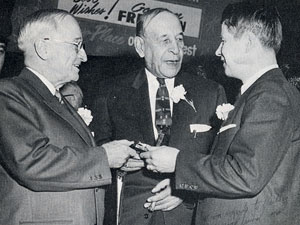|
Audio
Photos
|
February 24, 2005
One-hundred years ago, when newly-elected Gov. John A. Johnson became Minnesota's first chief executive to have an office in the new state Capitol, he hired a black man to set up that office for him. Billy Williams became the gatekeeper to the governor's office. If you wanted to see the governor, you had to see Williams first.
St. Paul, Minn. — Williams had a good deal of authority, determining who really needed to talk to the chief executive -- and making the appropriate excuses for those who wouldn't get in.
"He seemed to know what the pecking order was. But he was always gracious, kind, polite, dignified," Miles Lord, Minnesota's attorney general in the mid-'50s, said. Lord worked across the hall from Williams.
"He was never governor, but he was in the minds of many people. He was the most important person at the state Capitol. He was the personification of state government. Gracious, welcome, courteous, ebullient," he said.
Williams began his tenure at the Capitol under Johnson and over the next 50-plus years worked as executive assistant to 14 consecutive governors. One of the last chief executives Williams worked for was Orville Freeman. Freeman's son, Mike, was just a boy when his father was in office in the mid-1950s. The younger Freeman says he loved to go to the Capitol.
"I didn't tell Dad this but one of the reasons is, I liked to sit next to Billy Williams and have him tell me stories. For my 7th or 8th birthday Billy Williams gave me a baseball that he'd played with on the 1903 Baltimore Orioles. And he gave it to me with quite some fanfare and I still have the baseball," he said.
Williams, known as a great story-teller, never did play for the Orioles.
Freeman says by the time his father took office, Williams was an institution at the Capitol, who often gave visitors tours while they waited for their appointments.
"He made everybody feel important. He just really loved people. He knew he had a special role there, that people were really counting on him to make it more human, more real. And he did that to young people and he did it to older people. Billy would welcome them and they would see this tall, gracious, good-looking, well-dressed person greeting them at the door with a big smile, 'How may I help you.' Everybody warmed up to that," he said.
Retired Minneapolis school principal Maurice Britts wrote a book about Williams. Britts says, since most African-Americans worked in service jobs at the time, Williams' appointment was significant.
"It was very important relative to blacks because there wasn't any other at that particular time. And it showed that in the eyes of Johnson that Billy was somebody, a person, that, even though he was black, could guard his back," he said.
Williams hadn't planned a career in government. At the turn of the century he was an exceptional baseball player, even earning an invitation to play for the Baltimore Orioles in 1904. But because the league didn't accept black players at the time, he would have had to pass himself off as Indian. So he refused and instead took the job with Gov. Johnson. Britts was a college student when he first met Williams through classmates who were friends with the Williams family. He says he felt compelled to write about him after that meeting.
"I wrote the book because I saw in him something that I thought ought to be preserved. He had worked for 14 different governors for 53 years and it wasn't civil service. In other words, it depended upon his fiduciary influence to be hired in the position in the Capitol, whether they were Republicans, Democrats. And, boy, that is something," he said.
When Billy Williams died in 1963 at the age of 86, seven Minnesota governors attended his funeral.







